
Structural Change and Economic Dynamics
Scope & Guideline
Decoding the Mechanisms of Structural Change
Introduction
Aims and Scopes
- Structural Economic Dynamics:
The journal focuses on the dynamics of structural change within economies, examining how shifts in industry, technology, and policy can influence economic growth and development. - Environmental Economics:
A significant area of focus is the interplay between economic activities and environmental outcomes, including the impact of carbon emissions, resource usage, and sustainable practices on economic structures. - Global Value Chains (GVCs):
The analysis of global value chains and their role in shaping economic outcomes, particularly in developing countries, is central to the journal's scope, including issues of inequality and productivity. - Institutional Analysis:
The journal emphasizes the role of institutions in economic dynamics, exploring how governance, policy frameworks, and institutional quality affect economic performance and structural change. - Technological Change and Innovation:
Technological advancements and their implications for structural transformation and economic growth are a core aspect of the journal’s focus, examining how innovation influences productivity and labor markets. - Labor Market Dynamics:
The journal investigates labor market changes in the context of structural transformations, including the effects of automation, digitalization, and labor policies on employment and wage dynamics.
Trending and Emerging
- Sustainable Development and Green Economics:
There is a significant increase in research focusing on sustainable development, particularly in relation to climate change, carbon emissions, and the transition to a low-carbon economy, highlighting the growing importance of environmental sustainability in economic dynamics. - Digital Transformation and the Economy:
The impact of digitalization on economic structures, labor markets, and productivity is a rapidly growing theme, reflecting the transformative role of technology in shaping modern economies. - Inequality and Economic Disparities:
Research on economic inequality, particularly in the context of global value chains and labor market dynamics, is gaining traction, emphasizing the need to address disparities arising from structural changes. - Resilience and Adaptation in Economic Systems:
Emerging studies focus on the resilience of economies in the face of shocks such as the COVID-19 pandemic, exploring how structural changes can enhance or undermine economic stability and adaptability. - Social and Institutional Factors in Economic Change:
There is a growing emphasis on the role of social and institutional factors in driving structural change, with research increasingly examining how governance, cultural contexts, and institutional frameworks influence economic dynamics.
Declining or Waning
- Traditional Industrial Policies:
There is a noticeable decline in the discourse surrounding traditional industrial policies that focus solely on protectionism and state intervention, as the journal increasingly emphasizes innovative and sustainable approaches to industrial development. - Macro-Economic Stability:
Research focusing on macroeconomic stability without considering structural dynamics has waned, reflecting a shift towards understanding economic fluctuations in the context of structural changes and their long-term implications. - Simplistic Economic Models:
The use of overly simplistic economic models that do not account for the complexities of structural change and institutional factors is declining, as the journal increasingly favors models that incorporate a broader range of variables and dynamics. - Conventional Trade Theories:
Conventional trade theories that do not integrate environmental or social dimensions are becoming less prominent, with the journal's focus shifting towards more comprehensive frameworks that consider sustainability and equity.
Similar Journals
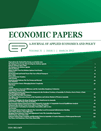
Economic Papers
Contributing to Policy-Making with Scholarly Excellence.Economic Papers is a prestigious journal published by WILEY, recognized for its contributions to the fields of economics, econometrics, and finance since its inception in 1982. With an impressive impact factor reflecting its scholarly influence, this journal is ranked in the Q2 category in the Economics, Econometrics, and Finance sector, placing it among the top 30% of journals in the field. The journal aims to disseminate high-quality research that addresses contemporary economic challenges, thereby advancing both theoretical understanding and practical applications. While currently not available as open access, Economic Papers provides vital insights for researchers, professionals, and students striving to deepen their comprehension of economic dynamics and contribute to sound policy-making. Scholars are encouraged to submit their work to engage with a robust academic community and impact the discourse in economic research.
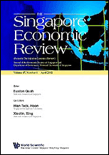
SINGAPORE ECONOMIC REVIEW
Illuminating the evolving dynamics of the global economy.SINGAPORE ECONOMIC REVIEW, published by WORLD SCIENTIFIC PUBL CO PTE LTD, stands as a prominent platform for research in the fields of economics and econometrics since its inception in 1983. With an ISSN of 0217-5908 and an E-ISSN of 1793-6837, this journal caters to a diverse audience by presenting high-quality, rigorously reviewed articles that address pressing economic issues both in Singapore and globally. Currently classified in the Q3 category for Economics and Econometrics for 2023, it ranks #265 out of 716 in Scopus, placing it in the 63rd percentile among economic journals. Although not open access, the articles published here contribute valuable insights into the evolving dynamics of economic theory and practice, making it an essential resource for researchers, educators, and policymakers alike. The journal's commitment to advancing economic research continues to foster dialogue and inspire innovative approaches within the academic community.

MANCHESTER SCHOOL
Illuminating contemporary economic challenges with scholarly insights.MANCHESTER SCHOOL, published by WILEY, is a leading academic journal in the field of Economics and Econometrics, with a rich legacy dating back to 1930. This esteemed journal fosters scholarly discourse by providing a platform for high-quality research articles that cover a broad spectrum of economic theories, empirical studies, and methodological advancements. With an impact factor reflective of its relevance and rigor, MANCHESTER SCHOOL is ranked in the Q3 category in Economics and Econometrics and holds a Scopus rank of #447 out of 716, placing it in the 37th percentile. Researchers and practitioners alike can access a wealth of knowledge through its diverse range of articles, contributing significantly to the advancement of economic science. While it does not offer Open Access options, the journal maintains a commitment to accessibility by providing in-depth analyses and discussions that are crucial for understanding contemporary economic challenges. Based in the United Kingdom, MANCHESTER SCHOOL continues to uphold its standard of excellence well into 2024 and beyond.
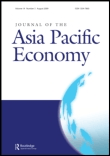
Journal of the Asia Pacific Economy
Bridging Theory and Practice in Asia Pacific StudiesThe Journal of the Asia Pacific Economy is a leading academic journal dedicated to exploring economic, political, and social developments across the Asia Pacific region. Published by Routledge Journals, Taylor & Francis Ltd, this journal has been a pivotal platform for scholarly communication since its inception in 1996, contributing to a deeper understanding of regional dynamics through a rigorous peer-review process. With an impressive positioning in the Q2 category across multiple disciplines, including Development, Geography, Planning and Development, and Political Science and International Relations, the journal excels in disseminating high-quality research that influences policy and academic discourse. Researchers and professionals alike benefit from its accessibility and scholarly relevance, drawing from diverse methodologies and theoretical frameworks to address pressing issues of the Asia Pacific economy. As it continues to publish until 2024, the journal remains dedicated to advancing knowledge and fostering collaboration within the academic community.
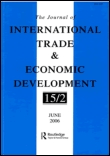
Journal of International Trade & Economic Development
Illuminating the Path of International Trade and DevelopmentJournal of International Trade & Economic Development is a premier academic journal published by Routledge Journals, Taylor & Francis Ltd, focusing on the critical interplay between international trade and economic growth within a global context. With an impressive impact factor and ranked in the second quartile for Aerospace Engineering and first quartile for both Development and Geography, Planning and Development in 2023, this journal stands at the forefront of research in its field. The journal's dedicated scope encompasses diverse themes, making significant contributions to the understanding of trade dynamics, development policies, and geographic implications of trade practices. Though currently not open access, the Journal of International Trade & Economic Development is widely recognized for its rigorous peer-review process and commitment to publishing high-quality research articles. As it converges from 1992 until 2024, it serves as an invaluable resource for researchers, professionals, and students aiming to navigate the complexities of trade and economic development on a global scale.
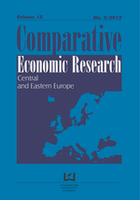
Comparative Economic Research-Central and Eastern Europe
Empowering Economists: Open Access to Critical ResearchComparative Economic Research-Central and Eastern Europe is a distinguished open-access journal published by LODZ UNIV PRESS, dedicated to advancing the field of economics with a focus on comparative studies relevant to Central and Eastern Europe. Since its inception in 2009, the journal has provided a vital platform for disseminating research that explores the unique economic challenges and opportunities faced by this region. With an H-index indicating its contributions to the academic discourse, the journal maintains a Q3 ranking in Economics, Econometrics, and Finance, reflecting the quality and relevance of its published works. This journal is instrumental for researchers, professionals, and students seeking to engage with contemporary economic issues and methodologies, fostering scholarly exchange and innovation. Access to its rich repository of articles is provided freely to promote wider dissemination of knowledge, enabling impactful discussions and policy formulations in the dynamically evolving landscape of the Central and Eastern European economy.
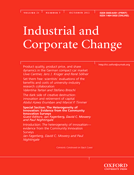
INDUSTRIAL AND CORPORATE CHANGE
Advancing Knowledge in Industrial TransformationINDUSTRIAL AND CORPORATE CHANGE, published by Oxford University Press, stands as a premier academic journal in the fields of Economics and Econometrics and Management of Technology and Innovation. With a distinguished Q1 ranking in both categories for 2023, this journal is recognized for its rigorous and impactful research contributions, holding a commendable position within the top percentiles of Scopus rankings. Since its inception in 1992, it has provided a vital platform for researchers and practitioners to explore the dynamics of industrial evolution, corporate strategies, and the intersection of technology and market practices, contributing to the understanding of modern economic landscapes. Although it does not currently offer open access, its compelling studies and insights are essential for scholars, industry professionals, and students eager to deepen their understanding of corporate dynamics and facilitate innovative management practices.
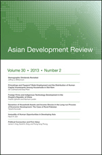
Asian Development Review
Advancing Knowledge for Sustainable Growth in AsiaThe Asian Development Review, published by World Scientific Publishing Co Pte Ltd, is a distinguished journal that has been at the forefront of scholarly discourse in the fields of development, economics, and geography since its inception in 1987. With an Open Access model adopted in 2013, this journal strives to enhance the accessibility of high-quality research, facilitating a broader dissemination of vital knowledge and insights that address pressing socio-economic challenges across the Asian landscape. The journal is classified in the Q2 Quartile category for 2023 in Development, Economics and Econometrics, as well as Geography, Planning, and Development, reflecting its substantial contribution to these fields. The journal also holds respectable rankings in Scopus, placing it in the top 45-55th percentile across various disciplines. Researchers, professionals, and students are encouraged to explore the wealth of research and methodologies presented in this impactful publication, which not only seeks to illuminate current issues but also aims to inform policy and practice across the Asian region.
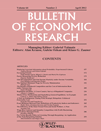
BULLETIN OF ECONOMIC RESEARCH
Your Gateway to Impactful Economic ResearchBULLETIN OF ECONOMIC RESEARCH is a premier academic journal published by WILEY, dedicated to the dissemination of high-quality research in the field of economics and econometrics. Established in 1948, the journal has a rich history of contributing to the scholarly dialogue surrounding economic theory and practice, making it an essential resource for researchers, professionals, and students alike. With an impressive impact factor and ranked in the Q3 category for 2023, the journal publishes original research articles, reviews, and theoretical discussions that reflect current trends and developments in the field. Despite not being an open-access journal, it offers numerous access options through institutional subscriptions, ensuring wide dissemination of its impactful content. Aiming to foster a deeper understanding of economic issues, the BULLETIN OF ECONOMIC RESEARCH serves as a vital platform for ongoing scholarly debate and innovation in economic thought.
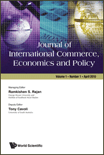
Journal of International Commerce Economics and Policy
Empowering Research in Commerce and Policy InnovationJournal of International Commerce Economics and Policy, published by WORLD SCIENTIFIC PUBL CO PTE LTD in Singapore, is a pivotal platform for interdisciplinary research that explores the dynamics of international commerce, economic theory, and policy formulation. With an ISSN of 1793-9933 and an E-ISSN of 1793-9941, the journal aims to disseminate significant insights contributing to the understanding of global economic frameworks and trade practices. It ranks in the Q3 category across various fields, including Business, Management and Accounting, Economics and Econometrics, and Finance, signifying its role in advancing knowledge and dialogue in these critical areas. Spanning a convergence of years from 2010 to 2024, the journal not only serves as a resource for researchers and practitioners but also fosters a vibrant academic community dedicated to addressing contemporary challenges in international commerce and economic policy. With an emphasis on open access, this journal ensures that research findings remain accessible to a global audience, thereby enhancing the impact and reach of its published works.